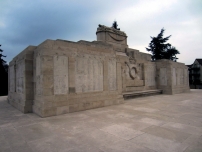| First Name: | John | Last Name: | PULLEN | |
|---|---|---|---|---|
| Date of Death: | 26/08/1914 | Lived/Born In: | St. Luke's | |
| Rank: | Gunner | Unit: | Royal Field Artillery 40Brigade 6Battery | |
| Memorial Site: | La Ferte-sous-Jouarre Memorial, France | |||
Current Information:Age-25 Born-St Luke's Enlisted-London
Le Cateau 26th August 1914 By the evening of the 25th August, after their withdrawal south following the Battle of Mons on 23rd August, II Corps of the BEF, commanded by General Smith-Dorrien, had reached Le Cateau, in France. They had been retreating, but still fighting rearguard actions for two long days and they were done in. The Commander-in-Chief, Sir John French ordered them to continue the next day but Smith-Dorrien chose instead to stand and fight. He reasoned that with the Germans on their heels a retreat would be disastrous without first halting the enemy advance. So, on the next day II Corps turned and faced the enemy. The town of Le Cateau saw little of the actual fighting on 26th August, the main actions taking place along the line of the road running between Le Cateau and Cambrai. A fierce battle ensued when the Germans began an artillery bombardment at dawn. Their infantry followed up in the wake of this barrage and became the targets of both the British artillery and infantry. The Germans were held at bay until the afternoon but by then they were threatening the flanks of II Corps which withdrew, whilst the enemy reorganised. British casualties for the day, killed, wounded or taken prisoner, were nearly 8,000. During the battle on 26 August, 1914, the British artillery fired air bursting shrapnel shells at the advancing German infantry. In order to do this they were employed out in the open, just behind the infantry and firing over open sights. This meant that they were in full view of the German guns and as a consequence they suffered many casualties. In contrast, the German artillery were in concealed positions and relied on forward observers to direct their fire. In the afternoon when II Corps fell back, some of the guns were lost.
40 Brigade of the Royal Field Artillery, which included the 6th Battery, were attached to the 3rd Division and were engaged against German troops moving up the valley from Béthencourt towards Inchy. By the afternoon the British line came under severe pressure and a withdrawal was ordered. Whilst falling back they lost three guns when the gun teams were killed by German shells. One of their casualties was John Pullen.
|
||||
| « Back to Search Results | ||||
| If you think any of the information shown here is incorrect, Click Here to submit your amends and comments | ||||




